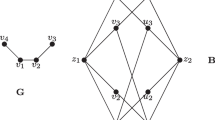Abstract
In the Fixed Cost k-Flow problem, we are given a graph G = (V, E) with edge-capacities {u e ∣e ∈ E} and edge-costs {c e ∣e ∈ E}, source-sink pair s, t ∈ V, and an integer k. The goal is to find a minimum cost subgraph H of G such that the minimum capacity of an st-cut in H is at least k. By an approximation-preserving reduction from Group Steiner Tree problem to Fixed Cost k-Flow, we obtain the first polylogarithmic lower bound for the problem; this also implies the first non-constant lower bounds for the Capacitated Steiner Network and Capacitated Multicommodity Flow problems. We then consider two special cases of Fixed Cost k-Flow. In the Bipartite Fixed-Cost k-Flow problem, we are given a bipartite graph G = (A ∪ B, E) and an integer k > 0. The goal is to find a node subset S ⊆ A ∪ B of minimum size |S| such G has k pairwise edge-disjoint paths between S ∩ A and S ∩ B. We give an \(O(\sqrt {k\log k})\) approximation for this problem. We also show that we can compute a solution of optimum size with Ω(k/polylog(n)) paths, where n = |A| + |B|. In the Generalized-P2P problem we are given an undirected graph G = (V, E) with edge-costs and integer charges {b v : v ∈ V}. The goal is to find a minimum-cost spanning subgraph H of G such that every connected component of H has non-negative charge. This problem originated in a practical project for shift design [11]. Besides that, it generalizes many problems such as Steiner Forest, k-Steiner Tree, and Point to Point Connection. We give a logarithmic approximation algorithm for this problem. Finally, we consider a related problem called Connected Rent or Buy Multicommodity Flow and give a log3+𝜖 n approximation scheme for it using Group Steiner Tree techniques.

Similar content being viewed by others
References
Bar-Ilan, J., Kortsarz, G., Peleg, D.: Generalized submodular cover problems and applications. Theor. Comput. Sci. 250(1-2), 179–200 (2001)
Bartal, Y.: On approximating arbitrary metrices by tree metrics. In STOC, pp. 161–168 (1998)
Calinescu, G., Zelikovsky, A.: The polymatroid steiner problems. J. Comb. Optim. 9(3), 281–294 (2005)
Carr, R., Fleischer, L., Leung, V., Phillips, C.: Strengthening integrality gaps for capacitated network design and covering problems. In SODA, pp. 106–115 (2000)
Chakrabarty, D., Chekuri, C., Khanna, S., Korula, N.: Approximability of capacitated network design. In IPCO, pp. 78–91 (2011)
Chakrabarty, D., Krishnaswamy, R., Li, S., Narayanan, S.: Capacitated network design on undirected graphs. In APPROX-RANDOM, pp. 71–80 (2013)
Chekuri, C., Even, G., Kortsarz, G.: A greedy approximation algorithm for the group Steiner problem. Discrete Appl. Math. 154(1), 15–34 (2006)
Even, G., Kortsarz, G., Slany, W.: On network design problems: fixed cost flows and the covering steiner problem. ACM Trans. Algorithm. 1, 74–101 (2005)
Fakcharoenphol, J., Rao, S., Talwar, K.: A tight bound on approximating arbitrary metrics by tree metrics. J. Comput. Syst. Sci. 69(3), 485–497 (2004)
Garg, N., Konjevod, G., Ravi, R.: A polylogarithmic approximation algorithm for the group Steiner tree problem. J. Algorithm. 37(1), 66–84 (2000)
Gaspero, L.D., Gärtner, J., Kortsarz, G., Musliu, N., Schaerf, A., Slany, W.: The minimum shift design problem. Annals OR 155(1), 79–105 (2007)
Goemans, M.X., Goldberg, A.V., Plotkin, S.A., Shmoys, D.B., Tardos, E., Williamson, D.P.: Improved approximation algorithms for network design problems. In SODA, pp. 223–232 (1994)
Goemans, M.X., Williamson, D.P.: A general approximation technique for constrained forest problems. SIAM J. Comput. 24(2), 296–317 (1995)
Hajiaghayi, M., Khandekar, R., Kortsarz, G., Nutov, Z.: Combinatorial algorithms for capacitated network design. CoRR, abs/1108.1176, 2011 (2011)
Halperin, E., Krauthgamer, R.: Polylogarithmic inapproximability. In STOC, pp. 585–594 (2003)
Harrelson, C., Hildrum, K., Rao, S.: A polynomial-time tree decomposition to minimize congestion. In SPAA, pp. 34–43 (2003)
Wolsey, L.A.: An analysis of the greedy algorithm for the submodular set covering problem. Combinatorica 2, 385–393 (1982)
Zosin, L., Khuller, S.: On directed steiner trees. In SODA, pp. 59–63 (2002)
Acknowledgments
We thank Deeparnab Chakrabarty for suggesting us to study the Bipartite Fixed-Cost k-Flow problem. We also thank anonymous referees for useful comments.
Author information
Authors and Affiliations
Corresponding author
Additional information
Part of this work was done at DIMACS. We thank DIMACS for their hospitality. A preliminary version appeared in archive [14] in 2011. Supported in part by NSF CAREER award 1053605, ONR YIP award N000141110662, DARPA/AFRL award FA8650-11-1-7162, and University of Maryland Research and Scholarship Award (RASA). The author is also with AT&T Labs– Research, Florham Park, NJ. Supported in part by NSF grant number 434923.
Rights and permissions
About this article
Cite this article
Hajiaghayi, M., Khandekar, R., Kortsarz, G. et al. On Fixed Cost k-Flow Problems. Theory Comput Syst 58, 4–18 (2016). https://doi.org/10.1007/s00224-014-9572-6
Received:
Accepted:
Published:
Issue Date:
DOI: https://doi.org/10.1007/s00224-014-9572-6




